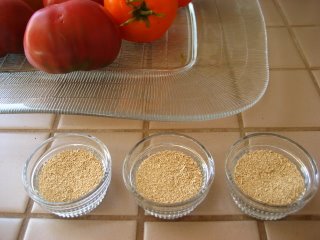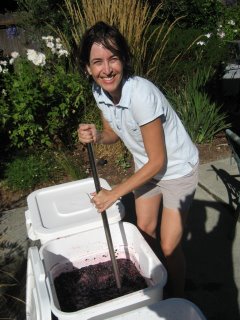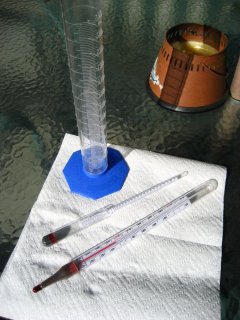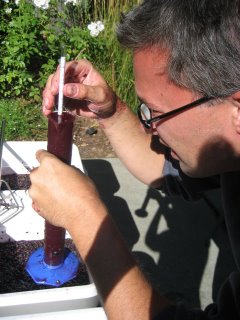 It's almost midnight. Anthony stands at the counter with 3 ramekins, divying tartaric acid and nutrients which will be incorporated into the 3 bins of grapes.
It's almost midnight. Anthony stands at the counter with 3 ramekins, divying tartaric acid and nutrients which will be incorporated into the 3 bins of grapes.We got a late start because I underestimated the prep time for my dinner of salmon steamed atop an heirloom tomato and sweet pepper stew. And then the neighbors called us for an ice cream run to Screaming Mimi's; impossible to pass on homemade strawberry and galaxy chocolate chip scoops.

 The sugar level (brix) of our grapes is higher than we'd like, so some corrections need to be made or else fermentation will stall because excess alcohol will kill the yeast. After 2 days of calculations and debate, Anthony determined that 1 gallon of water should be added to each bin to reduce the brix and reach a reasonable potential alcohol level.
The sugar level (brix) of our grapes is higher than we'd like, so some corrections need to be made or else fermentation will stall because excess alcohol will kill the yeast. After 2 days of calculations and debate, Anthony determined that 1 gallon of water should be added to each bin to reduce the brix and reach a reasonable potential alcohol level.Fortunately, he's handling the algebra. My chief duty is punch down. I cover the AM and afternoon shifts. Like clockwork, at 10AM and 4PM, I rinse off the mammoth metal tool that resembles a potato masher and press it through the dense must of seeds, stems, and skins that rises to the top. Sweeping it through the grapes to tumble them draws in air and encourages a purple froth to swell up through the mishmash. Day by day when I uncover the bins, there's a thicker mass of seeds and stem remnants jacketing the juice below.
Anthony calls out initial temperatures and brix levels and I jot them down: Bin 1, 76 degrees and 26.2 brix; Bin 2, 76 degrees and 26 brix; Bin 3, 75 degrees and 26.2 brix. He'll input all this data into a spreadsheet later.

There's quite a lot of tension as he adds the carefully allocated water, nutrients, and acid. Thomas, the orphaned kitten we found living behind our barbecue, relentlessly climbs the screen door facing our patio crush pad, putting more strain on our nerves. What will happen to the sugar levels?
Magically, brix drops within minutes of the prior readings, plummetting to 22.8. I hear a sigh outside, but don't know if it's from relief or worry.
Turns out Anthony had hoped to shave it by 3 degrees, so we appear to be on track again.



0 Comments:
Post a Comment
<< Home